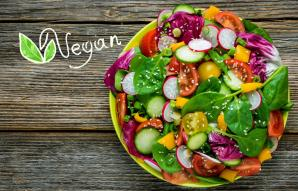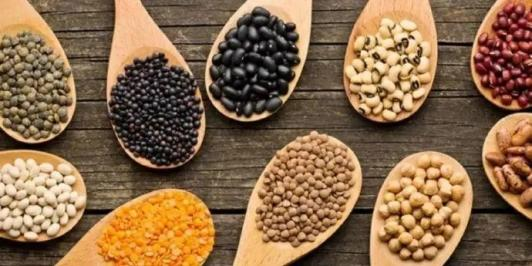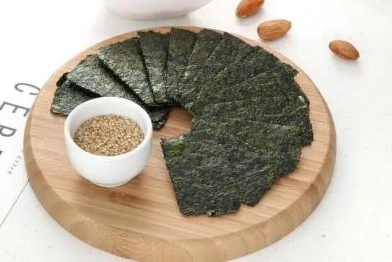Vegan diets are healthy and nutritious for people of all ages. Eating animal food substitutes such as nuts, seeds, beans and tofu can not only increase the variety of diet, but also provide the body with adequate protein and other nutrients. By eating a variety of whole plant foods at each meal instead of meat, dairy, and eggs, people are likely to get more vitamins, minerals, antioxidants, and nutrients. Plant-based foods are beautiful, and as long as we get enough energy from a variety of healthy, whole plant foods, we have everything we need to thrive.

1. Protein
Protein is one of the biggest concerns for most people. Some vegan foods are not complete in amino acids, which means beans only have 18 amino acids and soybeans only have 15 amino acids out of 20. Amino acids (amino acid foods) are used to make muscle, hormones, and enzymes that are often needed, all of which come from protein, so protein is very important. The protein of our Oriental country absorbs comes from huangshi, gluten, bean stem to wait, but these food did not have complete protein, so vegetarian person should eat different legume ability is ok, the main source of protein has all sorts of legume, bean bud kind, vegetables and fruits, wheat kind, stone fruit and melon seeds to wait.

2.Calcium
We've all been taught to believe that we need to drink milk to have strong and healthy bones. Yes, we do need calcium for bone health, but we don't need to get it from milk. Plant-based foods provide all the calcium we need. The main sources of calcium are:
Vegetables: celery, rape, carrot, cabbage, watercress, coriander, black fungus, nori, mushrooms and so on;
Fruit and dried fruit: lemon, loquat, apple, jujube, apricot, orange cake, peach, almond, hawthorn, raisin, walnut, watermelon seeds, pumpkin seeds, dried mulberry, peanut, lotus seeds, sesame, etc.
Beans and bean products: soybeans, edamame beans, lentils, broad beans, tofu, dried bean curd, bean curd skin, bean curd, etc.

3.Iron
A lot of people think that vegans have to avoid iron because they don't eat meat. But in reality, the difference in iron deficiency rates between vegans and non-vegans is so small that humans are perfectly capable of absorbing and using iron produced by plants. Plant foods rich in iron include whole grains, beans (especially black beans), dark leafy vegetables, seaweed, tofu, pumpkin seeds, etc.
The recommended daily intake is 10 mg for adult men and 15 mg for adult women.
4.Essential fatty acid(Omega 3and 6)
We often hear omega-3 referred to as the "good" fatty acid when we need more of it, while omega-6s are seen as the fatty acid we should be cutting back on. However, these two fatty acids are essential for human health. The question is not just balance, but good and bad. Ideally, we should balance omega-6 with omega-3 at 1:1 or 3:1 at most. Typically in our Western diet, where the balance ranges from 16:1 to 50:1, a high ratio of omega-6 to omega-3 has been linked to a variety of diseases - among them arthritis, diabetes, depression, heart disease, stroke and even cancer. Balance can be achieved in two ways. By reducing omega-6 or increasing the number of omega-3s. Cutting back on omega-6s is easy by cutting back on processed foods, processed vegetable oils and animal products. If you need omega-3 algae oils, supplement them with whole plant food sources, including flaxseed, walnuts and low erucic acid canola oil.
5.Vitamin B12
Vtamin B12 can be obtained from soy milk, soy milk, and kelp added to cereal.
In addition, vegans should also note:
1.Add more vitamin C in the diet to promote iron absorption, such as green pepper, cauliflower, green leafy vegetables, tomatoes, etc
2.When cooking, try to use iron pot, use vinegar and lemon to flavor, help iron dissolve and absorb;
3.Eat more fruits rich in vitamin C, such as dates, oranges and so on
4.To get enough zinc, need to eat some nuts, oilseed food, such as sunflower seeds, hazelnuts, black sesame, etc.
5.Vitamin B12 can supply by fungi in food and fermentation soy products, including various kinds of mushrooms, mushrooms, fungus, etc., and bean paste, preserved bean curd, tempeh, laozhao, etc.
A good way to get antioxidants is to load up on soy products, a variety of nuts and leafy greens.
Eat sweet food less, cook delicate, change fine white rice and noodles into all sorts of coarse grains as far as possible, just be helpful for promoting health, maintain appropriate weight.
